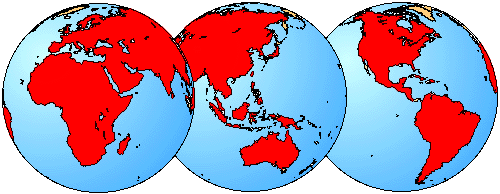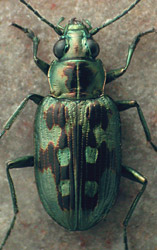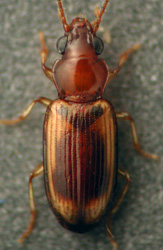Bembidiini
David R. Maddison- Bembidiina
- Xystosomina
- Anillina
- Tachyina
Introduction
Bembidiines are small, often abundant carabids. They are most commonly found along margins of bodies of water, although there are numerous species living in more xeric conditions, and many dwelling in the soil (e.g., anillines). There is also a radiation of arboreal forms in the tropics (xystosomines). There are over 3000 species.
Characteristics
The most distinctive feature of members of the tribe is the reduced terminal article of the maxillary and labial palpi:


This feature is shared among carabids only with Gehringiini and some Trechini.
Discussion of Phylogenetic Relationships
No comprehensive examination of the phylogenetic relationships of the genera of bembidiines has been published; the poorly resolved tree presented above is based upon suggestions by Erwin (1972, 1994) about the phylogeny. Erwin (1972) proposes that the anillines are a polyphyletic grade derived from within the tachyines.Geographic Distribution
Worldwide, with Bembidion dominant in colder regions, especially the north Temperate zone, and Tachyina and Xystosomina predominant in the tropics


References
Erwin, T. L. 1972. Two new genera of bembidiine carabid beetles from Australia and South America with notes on their phylogenetic and zoogeographic significance (Coleoptera). Breviora, 383: 1–19.
Erwin, T.L. 1994. Arboreal beetles of tropical forests: The Xystosomi group, subtribe Xystosomina (Coleoptera: Carabidae: Bembidiini). Part I. Character analysis, taxonomy, and distribution. The Canadian Entomologist, 126:549-666.
Title Illustrations

| Scientific Name | Bembidion zephyrum |
|---|---|
| Location | USA: Oregon: Whalehead Beach |
| Image Use |
 This media file is licensed under the Creative Commons Attribution License - Version 3.0. This media file is licensed under the Creative Commons Attribution License - Version 3.0.
|
| Copyright |
© 1995 David R. Maddison

|
| Scientific Name | Pericompsus laetulus |
|---|---|
| Location | Arizona |
| Image Use |
 This media file is licensed under the Creative Commons Attribution License - Version 3.0. This media file is licensed under the Creative Commons Attribution License - Version 3.0.
|
| Copyright |
© 1995 David R. Maddison

|
About This Page
David R. Maddison

Oregon State University
Correspondence regarding this page should be directed to David R. Maddison at
Page copyright © 2012 David R. Maddison
 Page: Tree of Life
Bembidiini.
Authored by
David R. Maddison.
The TEXT of this page is licensed under the
Creative Commons Attribution License - Version 3.0. Note that images and other media
featured on this page are each governed by their own license, and they may or may not be available
for reuse. Click on an image or a media link to access the media data window, which provides the
relevant licensing information. For the general terms and conditions of ToL material reuse and
redistribution, please see the Tree of Life Copyright
Policies.
Page: Tree of Life
Bembidiini.
Authored by
David R. Maddison.
The TEXT of this page is licensed under the
Creative Commons Attribution License - Version 3.0. Note that images and other media
featured on this page are each governed by their own license, and they may or may not be available
for reuse. Click on an image or a media link to access the media data window, which provides the
relevant licensing information. For the general terms and conditions of ToL material reuse and
redistribution, please see the Tree of Life Copyright
Policies.
- Content changed 06 January 2012
Citing this page:
Maddison, David R. 2012. Bembidiini. Version 06 January 2012 (under construction). http://tolweb.org/Bembidiini/94/2012.01.06 in The Tree of Life Web Project, http://tolweb.org/










 Go to quick links
Go to quick search
Go to navigation for this section of the ToL site
Go to detailed links for the ToL site
Go to quick links
Go to quick search
Go to navigation for this section of the ToL site
Go to detailed links for the ToL site